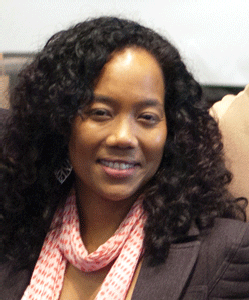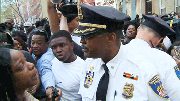As a young woman, actress Sonja Sohn took a career test that told her she was most fit to be either she says, “An air traffic controller or social worker.” The memory of it makes her laugh with a certain amount of irony. Her latest project is an indicator that the career test was onto something. “Put them together” she says, “and you get director of a social impact documentary.” She starts to chuckle, clearly still tickled at the thought. Sohn makes her directorial debut in the HBO documentary Baltimore Rising, which premieres November 20th.
Courtesy Photo
Lt. Colonel Melvin Russell, head of the Community Partnership Division of the Baltimore Police Department.
Sohn has appeared in numerous TV shows but is best known for her five-year turn as Detective Kima Greggs in the now classic HBO crime drama “The Wire,” a program famously shot and set in Baltimore. Though Sohn was raised in Newport News, Virginia once she began working in Baltimore that city started to feel more like a home to her.
“I just had this feeling about Baltimore as a home in a way that I think people don’t even understand home. I could literally feel it connecting to me. It carries as deep a meaning as if I’d been born there.” So much so that she started a nonprofit after “The Wire” ended called ReWired for Change, its mission is to help at risk youth. Sohn was in Los Angeles in the spring of 2015. ReWired for Change was on a hiatus.
Sohn had grown frustrated with a lot of the bureaucracy she encountered from the city while administering the program. “I was disgusted with how city leadership was treating the people in these underserved areas. There were so many people in the city who invested in raising up their community and the red tape and obstacles were mind boggling.”
Fate however, came calling in the wake of the demise of Freddie Gray. Disheartened by series of stories about the deaths of young men at the hands of police officers, Sohn had also sworn off the news at the time. “I was walking down the street and some of my fans called to me and asked me ‘Hey you see what’s happening in Baltimore?’” She hadn’t. “They were like, ‘You need to turn on the news. It’s burning.”
In short order, She wrote an op-ed about the events in Baltimore, quit a project she was working on at the time, and went back to Baltimore. “I was like, this little hiatus situation is over. I am being called back.”
Concern for fixing the ills of society swirled in her environment as a child who was very strongly shaped by her experiences with her father and the people in her neighborhood. “My father was active in the community. He was politically active. My babysitter sold the black newspaper and Jet magazine door to door and I went with her. There was a purpose to that. Black newspapers tell our story.”
“Baltimore Rising” is a documentary that focuses on the lives and challenges that confront activists as well as law enforcement in Baltimore. It features the lead investigator in the Freddie Gray case, Dawnyell Taylor, Lt. Colonel Melvin Russell who is head of the Community Partnership Division of the BPD, Police Commissioner Kevin Davis, and community leader Genard “Shadow” Barr. Then there is the focus on the next generation of change agents; the young activists Makayla Gilliam-Price, Dayvon Love, Adam Jackson, and Kwame Rose whose confrontation with Fox News’ Geraldo Rivera went viral. Baltimore Rising is a film that both takes a staunchly realistic view of the situation in Baltimore and overflows with empathy for the difficulties faced on all sides. Part of its power is the way it also shines a light on how activism affects the families of those involved in the struggle.
In terms of what she has learned from her years of activism Sohn says, “I hesitate to make any grand sweeping statement about how people should engage in any kind of empowerment activity. It makes a lot of sense to commit to protest work with other strategies that already exist but we’re up against hundreds of years old strategy that works against us. There’s no one way. There are many paths and many lanes and we need everybody driving on all those lanes.”

